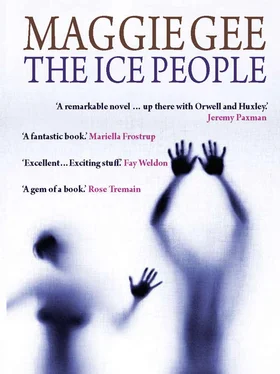Maggie Gee - The Ice People
Здесь есть возможность читать онлайн «Maggie Gee - The Ice People» весь текст электронной книги совершенно бесплатно (целиком полную версию без сокращений). В некоторых случаях можно слушать аудио, скачать через торрент в формате fb2 и присутствует краткое содержание. Год выпуска: 2008, Издательство: Telegram Books, Жанр: Фантастика и фэнтези, на английском языке. Описание произведения, (предисловие) а так же отзывы посетителей доступны на портале библиотеки ЛибКат.
- Название:The Ice People
- Автор:
- Издательство:Telegram Books
- Жанр:
- Год:2008
- ISBN:нет данных
- Рейтинг книги:4 / 5. Голосов: 1
-
Избранное:Добавить в избранное
- Отзывы:
-
Ваша оценка:
- 80
- 1
- 2
- 3
- 4
- 5
The Ice People: краткое содержание, описание и аннотация
Предлагаем к чтению аннотацию, описание, краткое содержание или предисловие (зависит от того, что написал сам автор книги «The Ice People»). Если вы не нашли необходимую информацию о книге — напишите в комментариях, мы постараемся отыскать её.
imagines an ice age enveloping the Northern Hemisphere. It is Africa’s relative warmth that offers a last hope to northerly survivors. As relationships between men and women break down, the novel charts one man’s struggle to save his alienated son and bring him to the south and to salvation.
Maggie Gee
The White Family
The Flood
The Ice People — читать онлайн бесплатно полную книгу (весь текст) целиком
Ниже представлен текст книги, разбитый по страницам. Система сохранения места последней прочитанной страницы, позволяет с удобством читать онлайн бесплатно книгу «The Ice People», без необходимости каждый раз заново искать на чём Вы остановились. Поставьте закладку, и сможете в любой момент перейти на страницу, на которой закончили чтение.
Интервал:
Закладка:
It’s hard to tell, this part of the story.
We sat down round their table and they told me what had happened, or a lying version of what happened. I veered between trusting their broad peasant faces and thinking they looked like child-molesters, murderers, two cunning traffickers in human flesh, their dark eyes glinting across the table.
This is what they told me. They had offered him food, lamb with habas, their filthy beans. Juanita was keen to tell me the menu, and Pedro eagerly confirmed it, very nice, apparently, but Luke hardly touched it, he wanted to go outside and explore, he’d complained that we had been driving for days, and now it was my turn to confirm it, eagerly, we were so desperate to agree on something. And so he had gone outside with their son, or perhaps their daughter, hijo, hija — my Spanish wasn’t good enough and nor was their English — but Luke went with someone, or maybe two people (how come these Spaniards still swarmed with children, I wanted to smash their fat stupid faces, but on with the story, get on, get on …).
The children couldn’t tell me themselves because they were out looking for Luke, and as that phrase was uttered, ‘looking for Luke’, I knew it would become my life.
Luke had gone with the girl or boy to the woods. He’d said he thought he had lost something there. I interrupted; it didn’t sound true — we had hardly paused as we drove past. When they got to the wood, they sat down and talked. Then all at once they were surrounded by salvajes . Pedro expressed horror and disgust. They were dirty, wild, cruel, revolting. His daughter or son had expected to be robbed, but instead, it seemed, the salvajes teased Luke, some ragtaggle girl was teasing him. ‘Tormenting him?’ I asked, in agony, ‘did they torture him? Because of his hair?’ His blondeness identified him so clearly as a foreigner, a refugee. No no, Pedro said, it was just teasing. They were in a good mood, they must have recently eaten. Luke and his companion escaped quite lightly.
Afterwards, the wild children dispersed, and Luke and the hijo, or hija, turned back. They were nearly at the house when Luke said suddenly, ‘I never found the thing I lost,’ and set off for the wood again, running, calling over his shoulder — the last thing he said, the last thing they remembered — ‘Tell my father not to worry.’
Or that is what they told me he said.
This was two hours ago, apparently. They’d started to worry after halfanhour and a party had gone to the wood to look. ‘Round here is not safe any more, señor . We look out for each other, we do our best. Is the salvajes, señor, for sure is them.’
‘Why would they want my son?’ I asked, frantic, but I could think of a thousand reasons, and all of them were horrible.
‘Some time they take people, make others pay,’ they said. They were avoiding each other’s eyes. There was something dreadful they wouldn’t tell me, and now I suppose I know what it was, but then I knew nothing about the wild children.
‘What else?’ I asked. ‘If they don’t ask for ransom? They can’t have robbed him, he had no money. We have no money, thanks to you and your friend —’
He changed the subject swiftly, lest I get angry. ‘Maybe he come back right now,’ he said. ‘Maybe he playing some game with them. Is young, entonces , must enjoy himself’.’ But I saw in his eyes that he didn’t believe it. I thought I saw pity there, and fear, and in another moment I changed my mind and saw nothing but bottomless deceit, cruelty, greed, peasant crudity.
They weren’t bad people, I realise now. Pedro had robbed us blind, of course, but what had happened to Luke was different. The Spanish were said to be soft about children, and Luke still counted as a child, and Pedro was a father of three, two hijos and a hija, I found, when I met them. The whole family seemed deeply distressed that Luke had gone missing while in their care.
And so I had to face the possibilities. One, he had been kidnapped by the salvajes. But we waited, and no ransom demand came. Two, he had been kidnapped by some other wrongdoer, bandit, mafioso, pederast, things too dreadful to think about. Three, he had gone away of his own accord, and was living somewhere quite happily, though Pedro flatly refused to believe this. ‘My children never leave me,’ he said, beating his chest for emphasis. ‘Your son never leave you either. You a good padre, you love your son.’ I knew this to be true, but it proved nothing. I recalled, wincing, how much we had quarrelled in the last few days before he disappeared … Four, he had been murdered, and there was no hope, but I knew I would never be able to believe that unless they sent me his bones, his blood –
I remember how often I found myself sobbing, sobbing and roaring like someone mad. I stayed with the family for over two months, until their patience must have been exhausted, and when I went to Pedro at last and told him I’d decided to move down the coast and search for Luke there, in the big resorts, he amazed me by taking me by the arm and dragging me down to his tiny office where he counted out, with elaborate gestures, every single ecu that I had paid him, and solemnly gave them back to me. I was glad to have it. I needed the money.
He promised me he’d listen, locally, ‘ear to the ground’. All might still be well. His wife had heard things, nothing solid, just gossip among the women and children …
When I questioned him, this disappeared, like mist unravelling in the sun, or hope dissolving, leaking away. But he did mean well. I know I misjudged them.
I had been searching aimlessly, frenetically, for over three months when Pedro left me a message at Estepona, where I had written to say I was staying. There was a rumour around the villages that a blonde boy had been sighted with the salvajes. There wasn’t a date, or a place, or a time, and the whole thing might be a garbled version of the story of Luke’s disappearance. All the same, I had been desperate for news, and my spirits rose unreasonably. I didn’t take it seriously enough to break off my search among the international crew of teenagers, some destitute, some wealthy, who smoked and dreamed in Estepona, the kind of friends my son might have made, but I let myself hope, I pulled back from the brink, I was a man again, no longer a drunk who shouted at women in flyblown bars.
Hope gave me the courage to do something I dreaded, something I knew I should have done before.
I rang Wicca, to find their number unobtainable. Phonesearch in London suggested a variety of other, more innocuous women’s institutions. By blind chance, or else god’slove, I found Sarah actually answering the phone at the fourth one of these I tried, the Women’s Institute for Cooperative Childcare.
I recognised her voice, smoky, snappy, deeper, drier than before, and I thought she would know mine, but my heart had stopped beating, my breathing was laboured — I probably sounded like any other heavy breather.
‘Yes, who is it?’ She sounded even more impatient than usual, possibly because I was a man. I knew she hadn’t recognised me.
‘Sarah’, I said. ‘It’s you, I know. Look, it’s Saul … Saul . I have something to tell you.’
There was a long silence. When she spoke again, her voice was unrecognisable, a howl, then an unsteady, furious, choking stream of incoherent questions. But she stopped herself, before I could answer, and her voice became very cold and thin.
‘Tell me where he is, Saul,’ she said, distinctly. ‘Or I swear I’ll kill you. Just tell me .’
‘He’s not with you?’ I said foolishly, remembering in the split second I spoke that we used to have exchanges like this when I was looking after Luke at home and she’d ring from work to see how he was and I would say, ‘Oh — isn’t he with you?’ A little joke, but against the rules.
Читать дальшеИнтервал:
Закладка:
Похожие книги на «The Ice People»
Представляем Вашему вниманию похожие книги на «The Ice People» списком для выбора. Мы отобрали схожую по названию и смыслу литературу в надежде предоставить читателям больше вариантов отыскать новые, интересные, ещё непрочитанные произведения.
Обсуждение, отзывы о книге «The Ice People» и просто собственные мнения читателей. Оставьте ваши комментарии, напишите, что Вы думаете о произведении, его смысле или главных героях. Укажите что конкретно понравилось, а что нет, и почему Вы так считаете.












